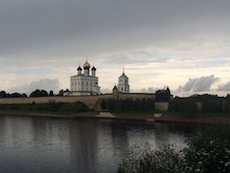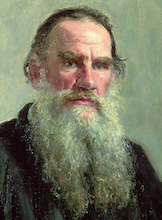Complete Course Listing
Courses in Russian language and literature may also be viewed in the Catalogue.
Russian Language Courses
RUS 1101-1102 - Elementary Russian I and II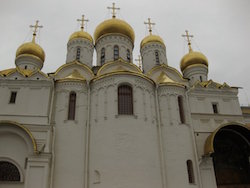
Introduction to the Cyrillic writing system and to the fundamentals of the Russian language. Emphasis on the gradual acquisition of active language skills: speaking, understanding, reading and writing. Students will learn to introduce family members and explain what they do for a living; describe their room, possessions, city, and culinary preferences; discuss their daily activities and travels; talk about their studies and what languages they speak; ask simple questions, voice opinions, make invitations, and engage in basic everyday conversations. Authentic multimedia cultural materials (cartoons, songs, poems, videos) supplement the textbook and serve as a window onto the vibrant reality of Russian culture today. Conversation hour with native speaker.
RUS 2203-2204 - Intermediate Russian I and II
Continuation of Elementary Russian. Emphasis on the continuing acquisition of active language skills: speaking, understanding, reading and writing. Students will improve their facility in speaking and understanding normal conversational Russian and will read increasingly sophisticated texts on a variety of topics. Authentic multimedia cultural materials (cartoons, songs, poems, videos, websites, short stories, newspaper articles) supplement the textbook and serve as a window onto the vibrant reality of Russian culture today. Conversation hour with native speaker.
 RUS 3005-3006 - Advanced Russian Language and Society I and II
RUS 3005-3006 - Advanced Russian Language and Society I and II
Building on the language skills developed in the Intermediate Russian I and II sequence, this course allows students to move beyond everyday language use to develop advanced lexical, grammatical and cultural knowledge on a variety of topics relevant to Russian speakers today. Within the context of a four-skills approach to language acquisition (writing, speaking, listening, reading), students engage with a wide variety of course materials in the target language, including Russian mass media, film, music, and literature. Individual units focus on specific issues or problems in modern Russian society, such as politics, art, health, identity and belonging, youth culture, economic development, technology and society. By the end of the course, students will be able to summarize and analyze different viewpoints on complex issues and articulate their own arguments both orally and in written Russian, from formulating clear theses to providing logical reasoning and evidence for their ideas. Conversation hour with native speaker.
RUS 4001-4002-4003 - Advanced Independent Study in Russian
As needed. On a literary or cultural topic by agreement with the supervising faculty member.
Russian Literature and Culture Courses (Taught in English)
RUS 1013 (First Year Seminar) - The Red World: Socialism as Imagined and Lived in Russia, 1917-1932
Just over a century ago, Russian revolutionaries promised to turn the capitalist world upside down and replace it with a modern socialist order based on the equality and dignity of all working people. Explores socialism in practice between 1917 and 1932, with an emphasis on both the utopian imagination and "lived" experience. Discussions and assignments will draw heavily on visual sources (art, posters, film, photography) to examine the radical transformation of Soviet culture and society. Topics include labor practices, education, family and gender roles, religious culture, science and technology, healthcare, housing and urban planning, and fashion and the arts. No previous knowledge of Russian history is necessary. Note: This course is part of the following field(s) of study: Europe.
RUS 2117 - Fallen Women and Superfluous Men: Tolstoy, Dostoevsky, and the Great Russian Novel
Introduces students to two giants of Russian literature, Tolstoy and Dostoevsky, and explores their significance to Russian cultural history and European thought. The course surveys the aesthetic contributions, literary styles, and artistic innovation of both authors through the close reading of their early and mature works. Themes of religion, philosophy, modernity, and art are examined through the complex lens of gender dynamics in nineteenth-century Russian literature. Special emphasis is placed on each novelist’s approach to questions of gender roles, masculinity, femininity, sexuality, prostitution, motherhood, free will, and social and familial duty. Sexual violence, suffering, spirituality, and redemption are further topics of interest. Studied texts include Dostoevsky's Crime and Punishment and Notes from Underground, as well as Tolstoy’s Anna Karenina, The Cossacks, and “The Kreutzer Sonata,” among others. (Same as GSWS 2217; fulfills Humanits, IP.)
RUS 2220 - Nineteenth-Century Russian Literature
Traces the development of Russian realism and the Russian novel in the context of contemporary intellectual history. Specific topics include the Russian response to Romanticism; the rejection of Romanticism in favor of the realistic exposure of Russia's social ills; Russian nationalism and literary Orientalism; the portrayal of women and their role in Russian society; the reflection of contemporary political controversies in Russian writing. Authors include Belinsky, Dostoevsky, Gogol, Lermontov, Pushkin, Tolstoy, and Turgenev.
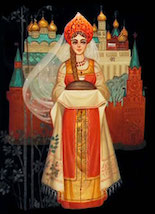 RUS 2222 - Russian Cinema
RUS 2222 - Russian Cinema
Since Lenin declared cinema the most important art, Russian film often walks in the shadows of political change. Despite or because of this tension, Russian directors have created some of the finest cinema in the world. l Investigates Russia's innovations in film technique and ideological questions that result from rewriting history or representing Soviet reality in film; attention to film construction balanced with trends in Russia's cinematic tradition. Directors studied include Eisenstein, Tarkovsky, and Vertov. Topics covered include film genre (documentary, comedy, western) and gender and sexuality in a changing sociopolitical landscape. (Same as CINE 2601; fulfills the non-US cinema requirement for cinema studies minors.)
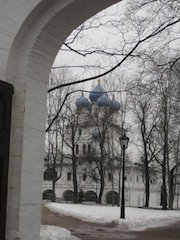 RUS 2225 - Lev Tolstoy, His Life and Work
RUS 2225 - Lev Tolstoy, His Life and Work
Introduces the important works of Lev Tolstoy. Focuses on the artistic, moral, and philosophical concerns of the author within the context of a selection of his short stories and novels, as well as theoretical, religious, and political texts. By focusing on autobiographical themes traced from his fictionalized autobiography Childhood through A Confession, develops an understanding of the interconnectedness of the life and art of one of the greatest novelists in Russian literary canon.
RUS 2232 - Structures of the Short Story
Explores fundamentals of narrative construction through reading short masterworks of Russian literature alongside a variety of creative writing assignments. What makes a story compelling—or, for that matter, what makes it a story at all? This course focuses on the complex machinery producing what John Gardner called the “vivid and continuous dream” of fiction, moving from what a story means to how it means. Our guides in this process will be the Russian writers who helped innovate and fine-tune the modern short story, from Pushkin to Turgenev to Chekhov, and whose legacies continue to hold sway over the form. In response to readings, students write short creative or analytical assignments on the narrative techniques under study. This course is meant for writers and literature students alike; no previous creative writing experience required. All course materials are in English. Note: Fulfills the creative writing concentration requirement for English majors.
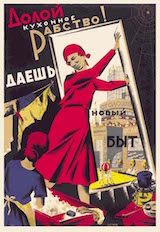 RUS 2234 - Spy vs. Spy: Cold War Espionage in Literature and Film
RUS 2234 - Spy vs. Spy: Cold War Espionage in Literature and Film
Examines the complex and dynamic relationship between the US and the Soviet Union/Eastern Bloc through the lens of espionage-themed literature and film from the early 20th century to the present day, with a special focus on the Cold War period. Using a comparative approach, the course explores the role of literature and film in shaping ideas and depictions of the threatening "other" and the ramifications of such depictions in the US and Soviet contexts. Major themes of discussion include national and cultural identity, constructed images and stereotypes of the other and enemy in the popular imagination in the States and Eastern Bloc, deviations from such depictions (specifically in the case of double agents), and changing gender roles and prominent women in espionage. Conducted in English. No previous background in Russian or Soviet history required. IP.
RUS 2245 - Rebels, Workers, Mothers, Dreamers: Women in Russian Art and Literature Since the Age of Revolution
Although the Russian cultural tradition has long been male-dominated, this paradigm began to shift with the advent of brilliant women writers and artists just prior to the Russian Revolution. Since the collapse of the USSR, women have again emerged as leaders in the tumultuous post-Soviet cultural scene, even overshadowing their male counterparts. This course explores the work of female Russian writers, artists, and filmmakers against a backdrop of revolutionary change, from the turn of the 20th century to the present. Themes include representations of masculinity and femininity in extremis; artistic responses to social, political and moral questions; and women's artistry as cultural subversion. (Same as GSWS 2249; fulfills Humanities, IP, ESD.)
RUS 2250 - Futures Past and Present in Russian and Eastern European Science Fiction
Overview of Russian and Eastern European utopian, dystopian and post-apocalyptic literature and film set in imaginary futures, from the late nineteenth century to the present. In this course, we will examine science fiction as a form of creative thought experiment, allowing writers and readers to consider sweeping questions about our place in a changing world. What does Yevgeny Zamyatin’s We, which presaged the rise of twentieth-century totalitarianism, say about social organization? What does Karel Capek’s R.U.R.—a work that gave us the word “robot” from the Czech—say about technological progress? What does Stanislaw Lem’s Polaris and its renowned Soviet film adaptation by Andrei Tarkovsky tell us about what it means to be human? We will explore these and other questions through a mix of analytical and creative assignments. All course readings and other materials in English; no previous experience in the language or region required.
RUS 2255 - The Egalitarian Empire: Ethnicity and Otherness in the Soviet Union (and Beyond)
Examines the lived experience of the Soviet Union's underrepresented ethnic groups through film and literature, including works by indigenous Siberian peoples, Central Asians, and Eastern Europeans (specifically in Ukraine and Belarus) from the early 20th century to the present. Using a postcolonial lens, the course investigates how the complex interactions between power, privilege, policy, colonizer, and colonized shaped the experience of Soviet "others" (who did not identify as ethnic Russians) and encourages reflection on difference, diversity, and inclusion in the US and Russian contexts. Themes include the Soviet multiethnic project and its shifting policies on indigenization, affirmative action, and ethnic cleansing, the history of contact and conflict between individual ethnic groups and Russians, changing gender dynamics, and the diverse sociogeographic and experiential reality of being the "other” in the Soviet Union. Conducted in English. No previous background in Russian or Soviet history required.
RUS 2302 - Russian Demonology
Restless corpses, malevolent forest demons and giant talking black cats: Russian storytelling is suffused with the uncanny light of black magic, from popular superstitions to vampires at the modern-day multiplex. In this course, we’ll investigate this abiding interest in the demonic, starting with Russian folk beliefs and tracing how these traditions were transformed by the great nineteenth-century writers like Dostoevsky and Gogol in their explorations of the darker recesses of the human heart. We’ll also look at how fictional portrayals of Satan in twentieth-century Soviet works convey the existential terror of life in Stalin’s Moscow, and how contemporary horror reflects cultural anxieties around nation and self in Russia today. Course themes include fears of otherness and gendered depictions of supernatural evil, the dread of death and the undead, the seductiveness of sin, and the complex mechanisms of redemption. (Fulfills Humanities, IP.)
RUS 2315 - Love, Sex, and Desire in Russian Literature and Culture
Russian culture is rich with depictions of the fundamental human experiences of love, sex, and desire. And while these depictions have often been subject to various forms of censorship, they have just as often served as expressions of dissent against rigid social, political, and artistic norms. This course explores the ideological and aesthetic significance of such themes as romance, lust, yearning, sexual violence, adultery, prostitution, religious passion, poetic inspiration, unrequited love, celibacy, gender identity, sexuality, masturbation, pornography, body image, sexual frustration, castration, and witchcraft in Russian literature and the arts from medieval times to the present day. Not only do the works studied inscribe “difference” on the bodies of their subjects, but Russia also functions as a social “other” against which students examine their own cultural assumptions. Authors may include Avvakum, Bulgakov, Chekhov, Dostoevsky, Gogol, Nabokov, Pushkin, Tolstoy, Tsvetaeva, Turgenev, Zamyatin. (Same as GSWS 2315; fulfills Humanities, IP.)
RUS 2410 - Post-Soviet Russian Cinema
Newly freed from censorship, Russian filmmakers in the quarter-century between 1990 and 2015 created compelling portraits of a society in transition. Their films reassess traumatic periods in Soviet history; grapple with formerly taboo social problems such as alcoholism, anti-Semitism, and sexual violence; explore the breakdown of the Soviet system; and critique the darker aspects of today’s Russia, often through the lens of gender or sexuality—specifically addressing subjects such as machismo, absent fathers, rape, cross-dressing, and birthing. Central themes are the rapid evolution of post-Soviet Russian society, the emergence of new types of social differences and disparities and the reinvention of old ones, and the changing nature of social roles within the post-Soviet social fabric. (Same as CINE 2602, GSWS 2410; fulfills the non-US cinema requirement for cinema studies minors; also fulfills Humanities, ESD, VPA.)
RUS 2413 - Memory in Contemporary Russian and East European Cinema
Examines the subject of collective memory and reconstructions of the past in post-socialist Eastern European cinema, focusing primarily on Russian-language films. How does this area of the world, with its fraught histories of wars, revolutions and other social upheavals, describe or inscribe the past in recent films, from the historical blockbuster to more intimate contemporary narratives haunted by past events? And how do these films about the darkest episodes of the region’s history shed light on the ways in which we either commemorate or repress historical traumas in our own culture(s) today? Scholarship on nostalgia, cultural taboos, repressed memory, reconciliation, and collective memory will help us to form a complex understanding of how filmmakers not only represent the past in their work, but also recreate it anew on the screen in order to fit the needs of the current moment.
RUS 2447 - Nature and the Environment in Russian Culture
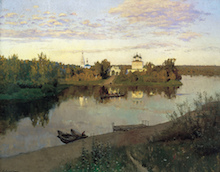 Introduces students to major works of Russian/Soviet/post-Soviet literature (by authors such as Pushkin, Turgenev, Chekhov, Solzhenitsyn, Alexievich, and others), supplemented by films and visual art, within the thematic context of a focus on nature and the environment in the Russian geographic and cultural space. Topics include the role of nature in the Russian Romantic sublime; artistic constructions of the exotic in Russia’s borderlands (Georgia, Mongolia); representations of the peasant village; feminization of the land and related metaphors of violent conquest; testaments to the instrumentalization of nature (St. Petersburg, Belomor Canal, Gulag); and the cultural legacy of environmental decay and disaster (pollution, Chernobyl). (Same as ENVS 2460; fulfills Humanities, IP.)
Introduces students to major works of Russian/Soviet/post-Soviet literature (by authors such as Pushkin, Turgenev, Chekhov, Solzhenitsyn, Alexievich, and others), supplemented by films and visual art, within the thematic context of a focus on nature and the environment in the Russian geographic and cultural space. Topics include the role of nature in the Russian Romantic sublime; artistic constructions of the exotic in Russia’s borderlands (Georgia, Mongolia); representations of the peasant village; feminization of the land and related metaphors of violent conquest; testaments to the instrumentalization of nature (St. Petersburg, Belomor Canal, Gulag); and the cultural legacy of environmental decay and disaster (pollution, Chernobyl). (Same as ENVS 2460; fulfills Humanities, IP.)
Russian Literature and Culture Courses (Taught in Russian)
RUS 3100 - My Beautiful, Pitiful Epoch: Readings from Modern Russian Literature
Russia has experienced a number of staggering transformations since the close of the nineteenth century, and these dramatic upheavals are mirrored in its national literature. This course will serve as an introduction to the evolution of Russian literature from the turn of the twentieth century, through the Revolution and the Soviet decades, to the contemporary post-Soviet period. Students will read and analyze important works of poetry and short prose from this era of radical change and experimentation, paying attention to the texts' social and cultural context, the specifics of their construction as works of verbal art, and the nuances conveyed by their creators' linguistic choices. All primary texts, discussions, and presentations will be in Russian, as will the majority of writing assignments. Emphasis on vocabulary development, stylistics, and the ability to articulate sophisticated arguments in both oral and written Russian. (Fulfills Humanities, IP.)
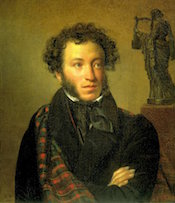 RUS 3210 - Petersburg: City, Myth, Text
RUS 3210 - Petersburg: City, Myth, Text
St. Petersburg looms large in Russian history, from its creation as Russia’s “window to the West” and its role in World War II to its post-Soviet incarnation as cultural antipode to Moscow. This course focuses on the rich assemblage of myth and literature around what Dostoevsky called "the most artificial city in the world." How did Petersburg’s creation as a planned city shape its physical space and make it a ready metaphor for European rationality? How do we square this with literary Petersburg—a realm of ghosts, madmen and doubles? We’ll read foundational Petersburg texts by Pushkin, Gogol, and Dostoevsky and trace how they inspired later authors like Blok, Akhmatova, and Tolstaya. We’ll also look at visual representations of Petersburg, from fine art to tourist brochures and contemporary films. All materials and assignments in Russian. Emphasis on reading complex texts, vocabulary development, and ability to articulate arguments in spoken and written Russian.
RUS 3214 - Russian Avant-Garde Arts at the Intersection of Word and Image
An interdisciplinary examination of early 20th-century Russian culture, focusing on the new expressive possibilities of word and image as the avant-garde waged war against the old aesthetics. Explores experimental works ranging from poetry and prose to literary manifestos, from paintings and graphic arts to avant-garde mixed-media projects, films, and performances. Works by Andrey Bely, Sergei Eisenstein, Natalia Goncharova, El Lissitzky, Vladimir Mayakovsky, Yury Olesha, Victor Shklovsky, Dziga Vertov, and others. Special attention to radical experiments across various artistic movements and aesthetic positions, and to interconnections between the Russian and western avant-gardes. All primary texts, discussions, and presentations and most writing assignments will be in Russian. Emphasis on learning to read and appreciate complex literary texts, vocabulary development, and the ability to articulate sophisticated arguments in both oral and written Russian. (Fulfills Humanities, IP, VPA.)
Honors Thesis
RUS 4050-4051 - Honors Project in Russian
Supervised by a Russian department faculty member or another affiliated faculty member with permission. A substantial, year-long research project on a topic of the student's choosing. Normally written in English but must include Russian-language primary and/or secondary sources.
Russian Courses Cross-listed with Other Departments
GOV 2410 - Post-Communist Russian Politics and Society
Explores the most dramatic political event of the twentieth century: the collapse of Soviet communism and Russia’s subsequent political development. Begins by examining the Soviet system and the political and social upheaval of the late Soviet period. Proceeds to investigate the challenges of contemporary Russian politics, including the semi-authoritarian regime, the challenges of sustainable economic growth and modernization, the demographic crisis, the loss of superpower status, and the search for a role in international politics. Comparisons made with other countries in the post-Communist region.
GOV 2577 - Arctic Politics
The Arctic looms in our political imagination as the region most directly affected by a changing global climate that threatens the displacement of northern communities and cultures. It is also a site of fierce competition for state control and economic development. This course investigates the Arctic as a political space that encapsulates elements of comparative politics and international relations. It examines cross-national variation in policies toward Arctic regions in states such as the United States, Canada, Russia, Iceland, and Norway. It also explores dynamic international engagement around the Arctic by state officials, corporations, indigenous communities, and activists. The course will address governance issues such as indigenous rights, economic development and natural resource exploitation, environmental issues and climate change, the potential militarization of the region, international law, and the role of the Arctic Council.
GOV 3510 - Post-Communist Pathways
Explores growing political, economic, and cultural diversity within the post-communist region after the enforced homogeneity of the Communist era. Considers the essential features of Communism and asks why these systems collapsed, before examining more recent developments. What are the factors promoting growing variation in the region? Why have some post-communist states joined the European Union, while others appear mired in authoritarianism? Do the institutional and cultural legacies of Communism influence contemporary politics? More than twenty years after the collapse of Communist regimes in East Central Europe and the Soviet Union, is “post-communism” still a useful concept for social scientists? Examines contemporary scholarship on the sources of change and continuity in the region and offers students the opportunity to undertake individual research projects.
HIST 2108 - The History of Russia, 1725-1924
Explores Russian identity, society, culture, and politics during three dramatically different phases of the modern period between Peter the Great and Lenin: the era of empire, autocracy, and serfdom under the tsars in the eighteenth and nineteenth centuries; Russia’s encounter with western ideas and forms of modernity in the late nineteenth century; and the revolutionary transformations of 1905 and 1917, ending in socialist rule under the Bolsheviks. Most readings are drawn from primary texts (novels, letters, memoirs, petitions, and ethnographic accounts); we will also regularly engage with forms of contemporary visual culture (especially painting, photography, and film) Note: This course fulfills the non-Euro requirement for history majors and minors.
HIST 2109 - Russia's Twentieth Century: Revolution and Beyond
Examines major transformations in Russian society, culture, and politics from the Revolutions of 1917 through the fall of the Soviet Empire in 1991. Topics include the building of socialist society under Lenin and Stalin, the political Terror of the 1930s and the expansion of the Gulag system, the experience of World War II, Soviet influence in Central Asia and Eastern Europe, attempts at de-Stalinization under Khrushchev, everyday life under “developed socialism,” the period of “glasnost” and “perestroika” under Gorbachev, and the problems of de-Sovietization in the early 1990s. Note: This course is part of the following field(s) of study: Europe.
